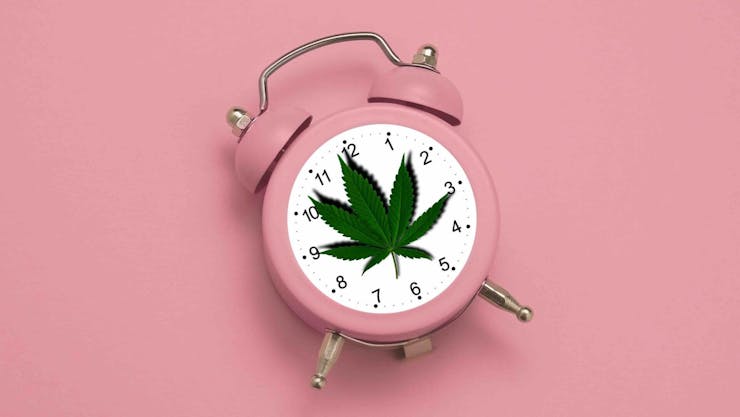Editor’s note: Are you too high right now? Go here to calm yourself or a friend.
One of the eternal questions in cannabis culture has finally been answered by science: After consuming marijuana, how long will you stay high?
In a 2021 study published in Neuroscience & Biobehavioral Reviews, researchers led by Danielle McCartney of the University of Sydney identified a “window of impairment” that lasts anywhere from three to ten hours, depending on the THC dose, the mode of ingestion, and the consumer’s previous cannabis experience.
After taking 20mg of THC, most consumers shed the high within four to five hours.
Those are a lot of factors, but the TL;DR is: generally, four hours.
The intoxicating high from a lighter inhaled dose will generally last for three hours, while a deep dabbing session or heavy edible may keep on hitting for six to ten hours.
Gathering data from 80 studies
McCartney and her colleagues undertook a comprehensive analysis of 80 scientific studies on cannabis dosage and intoxication.
Because the focus of their study was on the effect of cannabis intoxication on driving skill and awareness, much of the work skewed toward answering those questions.
The researchers found that cannabis consumers recovered most of their driving-related skills within five hours of inhaling 20mg of THC. Consumers who consumed the same amount of THC via an edible took longer to recover their driving skills. Most cannabis edibles in legal markets are dosed at 10mg per serving, and 100mg total THC per package.
“Overall, our results confirm that Δ9-THC impairs aspects of driving performance,” the researchers wrote. “There appears to be no universal answer to the question of How long to wait before driving? following cannabis use: Consideration of multiple factors is therefore required to determine appropriate delays between Δ9-THC use and the performance of safety-sensitive tasks.”
Edible highs hit later and last longer
The differences between inhaled THC and ingested THC (via edibles) were significant. It’s widely known that the effects of THC and other cannabinoids will be felt within minutes by consumers who smoke or vape cannabis products, while an edible or beverage can take up to an hour or more to hit.
In their review of the scientific literature, McCartney and colleagues found that the intoxicating effects of edibles and beverages usually last much longer than inhaled products.
Those researchers found that smoking or vaping 20mg of THC diminished a driver’s reaction time for roughly four hours. But ingesting 20mg of THC via an edible or beverage diminished reaction time for eight hours, twice as long. The study’s data indicated a THC-impaired driver’s reaction time was diminished at a significant but not dramatic level.
Heavy edible? Could be a 10-hour ride
“Our analysis indicates that impairment may last up to 10 hours if high doses of THC are consumed orally,” said McCartney, who works with the Australian university’s Lambert Initiative for Cannabinoid Therapeutics. “A more typical duration of impairment, however, is four hours, when lower doses of THC are consumed via smoking or vaporization and simpler tasks are undertaken.”
Shop highly rated dispensaries near you
Showing you dispensaries nearThat impairment—which cannabis consumers may experience as feeling high, or stoned, or deeply relaxed, or sleepy, or mirthful, or creative—“may extend up to six or seven hours if higher doses of THC are inhaled and complex tasks, such as driving, are assessed,” McCartney added.
For the purposes of this study, McCartney and associates considered 10mg of THC to be a moderate dose. But a moderate dose for a regular consumer, they added, could be a high dose for an occasional one.
Regular consumers show less impairment
As many cannabis consumers know, regular use can result in the body and mind building up a tolerance for cannabinoids ingested from sources outside the body, such as weed. This was also confirmed by the University of Sydney researchers.
Co-author Dr. Thomas Arkell, also from the Lambert Initiative, said: “We found that impairment is much more predictable in occasional cannabis users than regular cannabis users. Heavy users show significant tolerance to the effects of cannabis on driving and cognitive function, while typically displaying some impairment.”





